Comprehensive Report: Obesity, Interventions, and Public Health
VerifiedAdded on 2023/06/05
|6
|1261
|401
Report
AI Summary
This report provides a comprehensive overview of obesity, defining it as a medical condition characterized by a BMI of 30 or more, and explores its various health implications, including type 2 diabetes, heart disease, and cancer. It cites evidence from Emmons et al. (2018) to highlight obesity as a chronic medical condition and discusses various intervention methods, such as lifestyle changes, dietary modifications, exercise programs, and medical interventions including medications like Xenical and bariatric surgery. The report emphasizes the effectiveness of lifestyle and behavior changes as the primary intervention method, supported by research from De Bourdeaudhuij et al. (2015) and Beheshti et al. (2017). It also identifies public health organizations like the Stop Obesity Alliance and the Obesity Society and discusses their efforts in providing training and resources for managing obesity. The report also addresses controversies surrounding these interventions and offers recommendations for improvement, stressing the importance of qualified physicians and the need for patient-centered approaches.

Running head: OBESITY 1
Obesity
Name
Institution
Obesity
Name
Institution
Paraphrase This Document
Need a fresh take? Get an instant paraphrase of this document with our AI Paraphraser
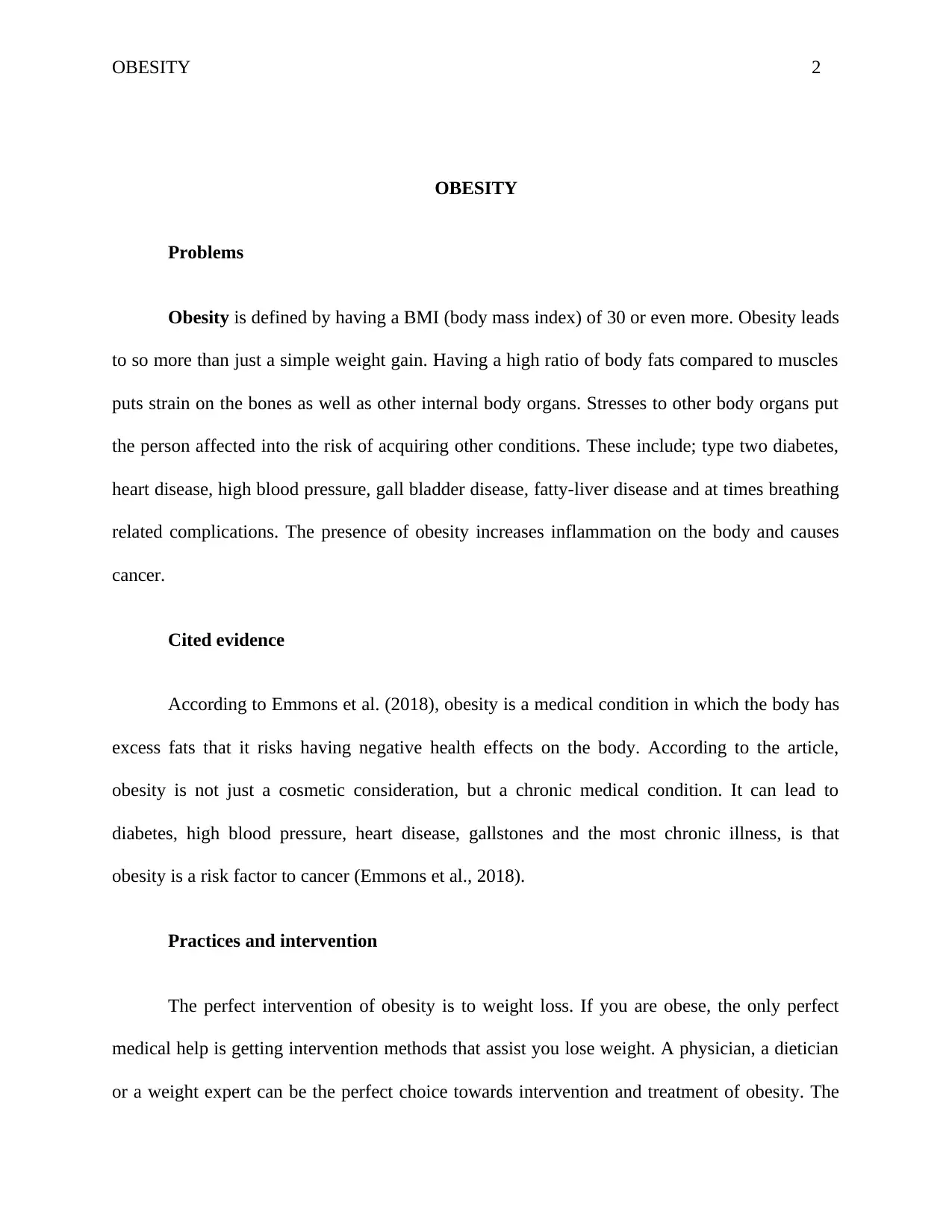
OBESITY 2
OBESITY
Problems
Obesity is defined by having a BMI (body mass index) of 30 or even more. Obesity leads
to so more than just a simple weight gain. Having a high ratio of body fats compared to muscles
puts strain on the bones as well as other internal body organs. Stresses to other body organs put
the person affected into the risk of acquiring other conditions. These include; type two diabetes,
heart disease, high blood pressure, gall bladder disease, fatty-liver disease and at times breathing
related complications. The presence of obesity increases inflammation on the body and causes
cancer.
Cited evidence
According to Emmons et al. (2018), obesity is a medical condition in which the body has
excess fats that it risks having negative health effects on the body. According to the article,
obesity is not just a cosmetic consideration, but a chronic medical condition. It can lead to
diabetes, high blood pressure, heart disease, gallstones and the most chronic illness, is that
obesity is a risk factor to cancer (Emmons et al., 2018).
Practices and intervention
The perfect intervention of obesity is to weight loss. If you are obese, the only perfect
medical help is getting intervention methods that assist you lose weight. A physician, a dietician
or a weight expert can be the perfect choice towards intervention and treatment of obesity. The
OBESITY
Problems
Obesity is defined by having a BMI (body mass index) of 30 or even more. Obesity leads
to so more than just a simple weight gain. Having a high ratio of body fats compared to muscles
puts strain on the bones as well as other internal body organs. Stresses to other body organs put
the person affected into the risk of acquiring other conditions. These include; type two diabetes,
heart disease, high blood pressure, gall bladder disease, fatty-liver disease and at times breathing
related complications. The presence of obesity increases inflammation on the body and causes
cancer.
Cited evidence
According to Emmons et al. (2018), obesity is a medical condition in which the body has
excess fats that it risks having negative health effects on the body. According to the article,
obesity is not just a cosmetic consideration, but a chronic medical condition. It can lead to
diabetes, high blood pressure, heart disease, gallstones and the most chronic illness, is that
obesity is a risk factor to cancer (Emmons et al., 2018).
Practices and intervention
The perfect intervention of obesity is to weight loss. If you are obese, the only perfect
medical help is getting intervention methods that assist you lose weight. A physician, a dietician
or a weight expert can be the perfect choice towards intervention and treatment of obesity. The
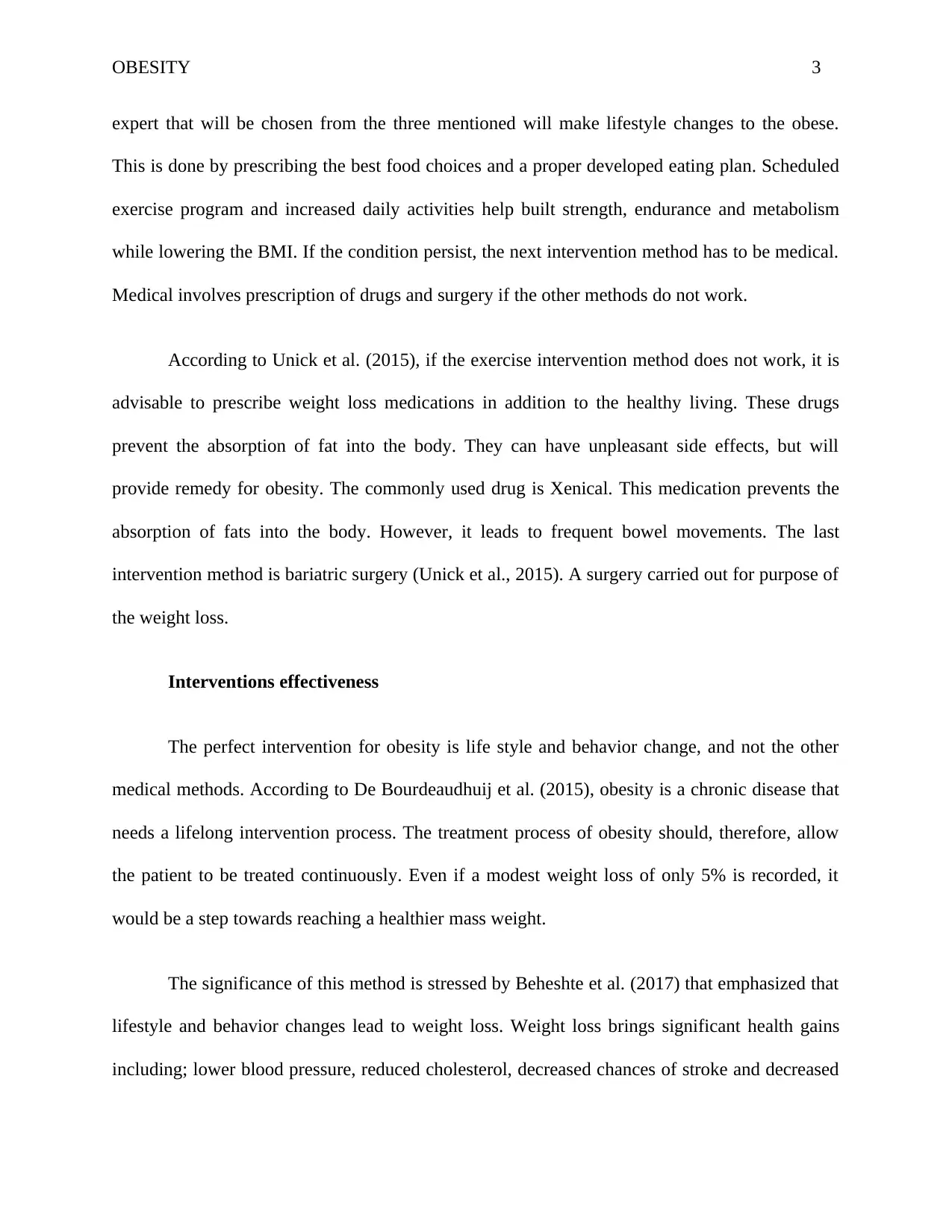
OBESITY 3
expert that will be chosen from the three mentioned will make lifestyle changes to the obese.
This is done by prescribing the best food choices and a proper developed eating plan. Scheduled
exercise program and increased daily activities help built strength, endurance and metabolism
while lowering the BMI. If the condition persist, the next intervention method has to be medical.
Medical involves prescription of drugs and surgery if the other methods do not work.
According to Unick et al. (2015), if the exercise intervention method does not work, it is
advisable to prescribe weight loss medications in addition to the healthy living. These drugs
prevent the absorption of fat into the body. They can have unpleasant side effects, but will
provide remedy for obesity. The commonly used drug is Xenical. This medication prevents the
absorption of fats into the body. However, it leads to frequent bowel movements. The last
intervention method is bariatric surgery (Unick et al., 2015). A surgery carried out for purpose of
the weight loss.
Interventions effectiveness
The perfect intervention for obesity is life style and behavior change, and not the other
medical methods. According to De Bourdeaudhuij et al. (2015), obesity is a chronic disease that
needs a lifelong intervention process. The treatment process of obesity should, therefore, allow
the patient to be treated continuously. Even if a modest weight loss of only 5% is recorded, it
would be a step towards reaching a healthier mass weight.
The significance of this method is stressed by Beheshte et al. (2017) that emphasized that
lifestyle and behavior changes lead to weight loss. Weight loss brings significant health gains
including; lower blood pressure, reduced cholesterol, decreased chances of stroke and decreased
expert that will be chosen from the three mentioned will make lifestyle changes to the obese.
This is done by prescribing the best food choices and a proper developed eating plan. Scheduled
exercise program and increased daily activities help built strength, endurance and metabolism
while lowering the BMI. If the condition persist, the next intervention method has to be medical.
Medical involves prescription of drugs and surgery if the other methods do not work.
According to Unick et al. (2015), if the exercise intervention method does not work, it is
advisable to prescribe weight loss medications in addition to the healthy living. These drugs
prevent the absorption of fat into the body. They can have unpleasant side effects, but will
provide remedy for obesity. The commonly used drug is Xenical. This medication prevents the
absorption of fats into the body. However, it leads to frequent bowel movements. The last
intervention method is bariatric surgery (Unick et al., 2015). A surgery carried out for purpose of
the weight loss.
Interventions effectiveness
The perfect intervention for obesity is life style and behavior change, and not the other
medical methods. According to De Bourdeaudhuij et al. (2015), obesity is a chronic disease that
needs a lifelong intervention process. The treatment process of obesity should, therefore, allow
the patient to be treated continuously. Even if a modest weight loss of only 5% is recorded, it
would be a step towards reaching a healthier mass weight.
The significance of this method is stressed by Beheshte et al. (2017) that emphasized that
lifestyle and behavior changes lead to weight loss. Weight loss brings significant health gains
including; lower blood pressure, reduced cholesterol, decreased chances of stroke and decreased
⊘ This is a preview!⊘
Do you want full access?
Subscribe today to unlock all pages.

Trusted by 1+ million students worldwide
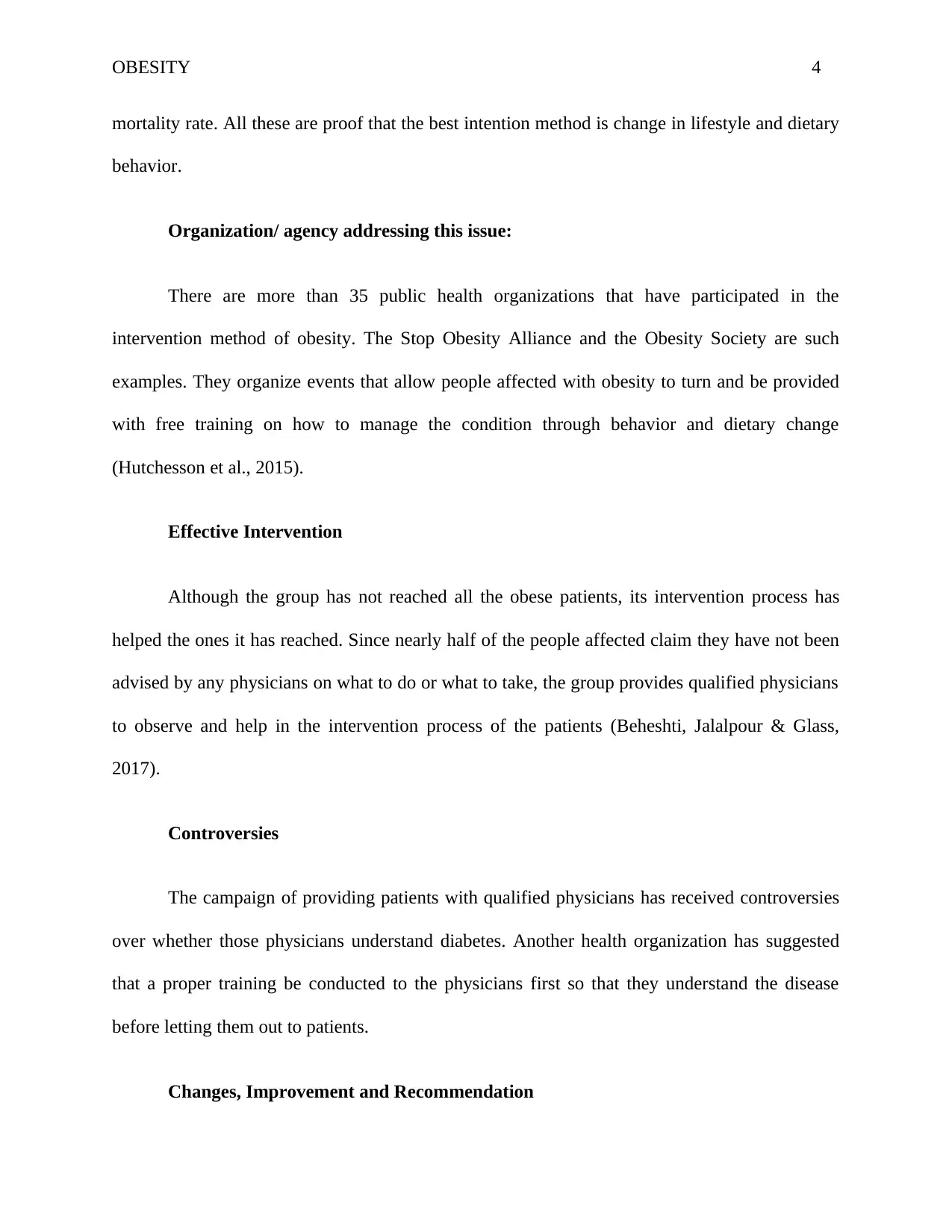
OBESITY 4
mortality rate. All these are proof that the best intention method is change in lifestyle and dietary
behavior.
Organization/ agency addressing this issue:
There are more than 35 public health organizations that have participated in the
intervention method of obesity. The Stop Obesity Alliance and the Obesity Society are such
examples. They organize events that allow people affected with obesity to turn and be provided
with free training on how to manage the condition through behavior and dietary change
(Hutchesson et al., 2015).
Effective Intervention
Although the group has not reached all the obese patients, its intervention process has
helped the ones it has reached. Since nearly half of the people affected claim they have not been
advised by any physicians on what to do or what to take, the group provides qualified physicians
to observe and help in the intervention process of the patients (Beheshti, Jalalpour & Glass,
2017).
Controversies
The campaign of providing patients with qualified physicians has received controversies
over whether those physicians understand diabetes. Another health organization has suggested
that a proper training be conducted to the physicians first so that they understand the disease
before letting them out to patients.
Changes, Improvement and Recommendation
mortality rate. All these are proof that the best intention method is change in lifestyle and dietary
behavior.
Organization/ agency addressing this issue:
There are more than 35 public health organizations that have participated in the
intervention method of obesity. The Stop Obesity Alliance and the Obesity Society are such
examples. They organize events that allow people affected with obesity to turn and be provided
with free training on how to manage the condition through behavior and dietary change
(Hutchesson et al., 2015).
Effective Intervention
Although the group has not reached all the obese patients, its intervention process has
helped the ones it has reached. Since nearly half of the people affected claim they have not been
advised by any physicians on what to do or what to take, the group provides qualified physicians
to observe and help in the intervention process of the patients (Beheshti, Jalalpour & Glass,
2017).
Controversies
The campaign of providing patients with qualified physicians has received controversies
over whether those physicians understand diabetes. Another health organization has suggested
that a proper training be conducted to the physicians first so that they understand the disease
before letting them out to patients.
Changes, Improvement and Recommendation
Paraphrase This Document
Need a fresh take? Get an instant paraphrase of this document with our AI Paraphraser
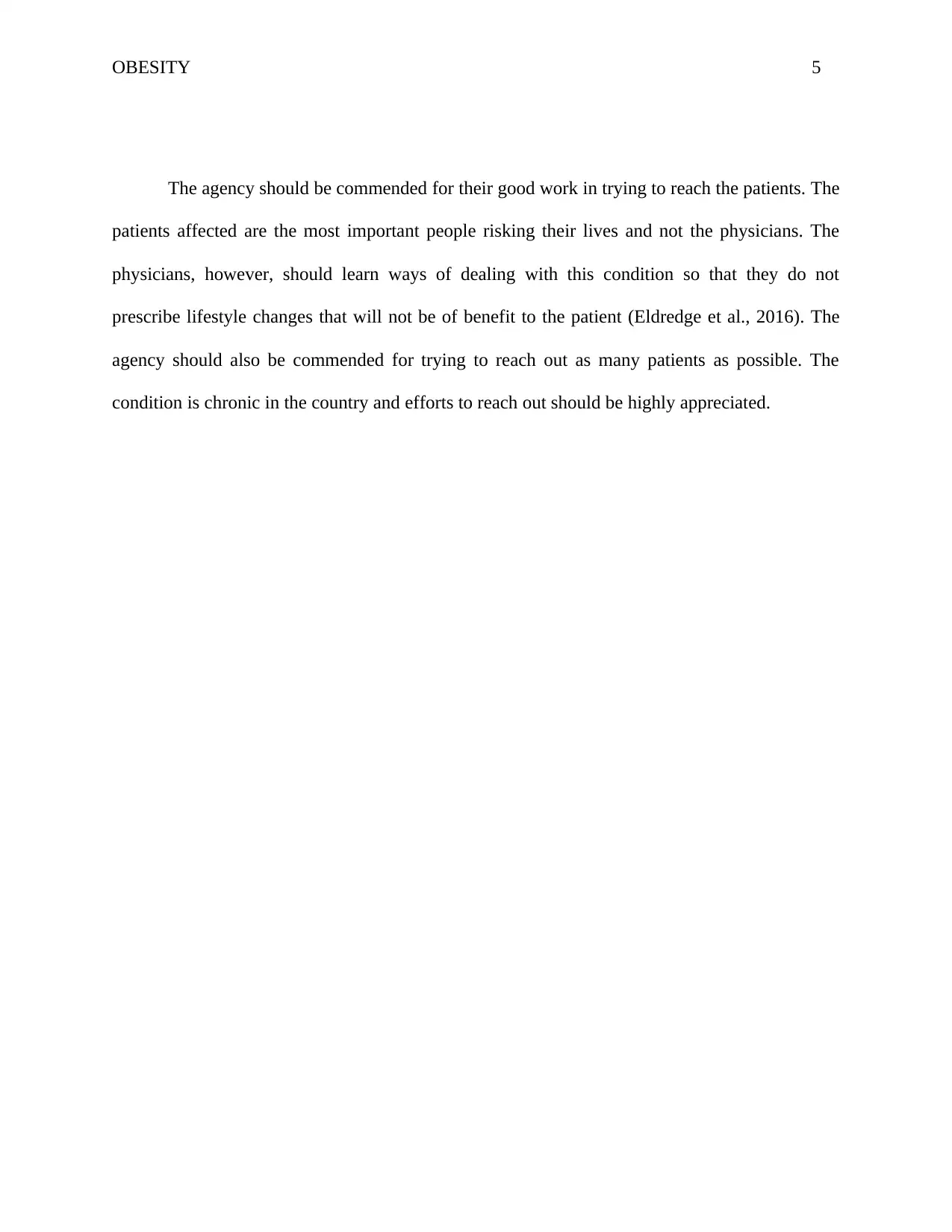
OBESITY 5
The agency should be commended for their good work in trying to reach the patients. The
patients affected are the most important people risking their lives and not the physicians. The
physicians, however, should learn ways of dealing with this condition so that they do not
prescribe lifestyle changes that will not be of benefit to the patient (Eldredge et al., 2016). The
agency should also be commended for trying to reach out as many patients as possible. The
condition is chronic in the country and efforts to reach out should be highly appreciated.
The agency should be commended for their good work in trying to reach the patients. The
patients affected are the most important people risking their lives and not the physicians. The
physicians, however, should learn ways of dealing with this condition so that they do not
prescribe lifestyle changes that will not be of benefit to the patient (Eldredge et al., 2016). The
agency should also be commended for trying to reach out as many patients as possible. The
condition is chronic in the country and efforts to reach out should be highly appreciated.
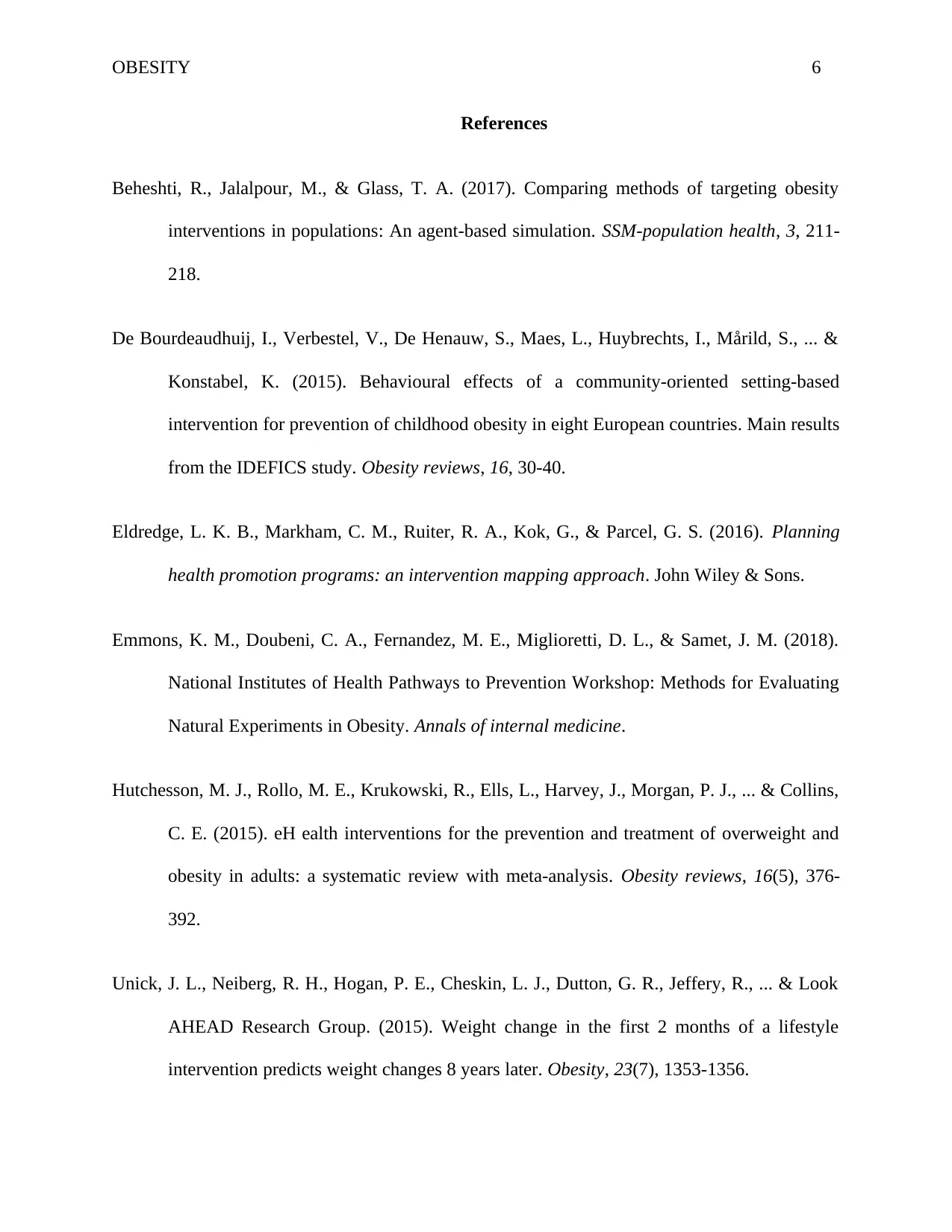
OBESITY 6
References
Beheshti, R., Jalalpour, M., & Glass, T. A. (2017). Comparing methods of targeting obesity
interventions in populations: An agent-based simulation. SSM-population health, 3, 211-
218.
De Bourdeaudhuij, I., Verbestel, V., De Henauw, S., Maes, L., Huybrechts, I., Mårild, S., ... &
Konstabel, K. (2015). Behavioural effects of a community‐oriented setting‐based
intervention for prevention of childhood obesity in eight European countries. Main results
from the IDEFICS study. Obesity reviews, 16, 30-40.
Eldredge, L. K. B., Markham, C. M., Ruiter, R. A., Kok, G., & Parcel, G. S. (2016). Planning
health promotion programs: an intervention mapping approach. John Wiley & Sons.
Emmons, K. M., Doubeni, C. A., Fernandez, M. E., Miglioretti, D. L., & Samet, J. M. (2018).
National Institutes of Health Pathways to Prevention Workshop: Methods for Evaluating
Natural Experiments in Obesity. Annals of internal medicine.
Hutchesson, M. J., Rollo, M. E., Krukowski, R., Ells, L., Harvey, J., Morgan, P. J., ... & Collins,
C. E. (2015). eH ealth interventions for the prevention and treatment of overweight and
obesity in adults: a systematic review with meta‐analysis. Obesity reviews, 16(5), 376-
392.
Unick, J. L., Neiberg, R. H., Hogan, P. E., Cheskin, L. J., Dutton, G. R., Jeffery, R., ... & Look
AHEAD Research Group. (2015). Weight change in the first 2 months of a lifestyle
intervention predicts weight changes 8 years later. Obesity, 23(7), 1353-1356.
References
Beheshti, R., Jalalpour, M., & Glass, T. A. (2017). Comparing methods of targeting obesity
interventions in populations: An agent-based simulation. SSM-population health, 3, 211-
218.
De Bourdeaudhuij, I., Verbestel, V., De Henauw, S., Maes, L., Huybrechts, I., Mårild, S., ... &
Konstabel, K. (2015). Behavioural effects of a community‐oriented setting‐based
intervention for prevention of childhood obesity in eight European countries. Main results
from the IDEFICS study. Obesity reviews, 16, 30-40.
Eldredge, L. K. B., Markham, C. M., Ruiter, R. A., Kok, G., & Parcel, G. S. (2016). Planning
health promotion programs: an intervention mapping approach. John Wiley & Sons.
Emmons, K. M., Doubeni, C. A., Fernandez, M. E., Miglioretti, D. L., & Samet, J. M. (2018).
National Institutes of Health Pathways to Prevention Workshop: Methods for Evaluating
Natural Experiments in Obesity. Annals of internal medicine.
Hutchesson, M. J., Rollo, M. E., Krukowski, R., Ells, L., Harvey, J., Morgan, P. J., ... & Collins,
C. E. (2015). eH ealth interventions for the prevention and treatment of overweight and
obesity in adults: a systematic review with meta‐analysis. Obesity reviews, 16(5), 376-
392.
Unick, J. L., Neiberg, R. H., Hogan, P. E., Cheskin, L. J., Dutton, G. R., Jeffery, R., ... & Look
AHEAD Research Group. (2015). Weight change in the first 2 months of a lifestyle
intervention predicts weight changes 8 years later. Obesity, 23(7), 1353-1356.
⊘ This is a preview!⊘
Do you want full access?
Subscribe today to unlock all pages.

Trusted by 1+ million students worldwide
1 out of 6
Related Documents
Your All-in-One AI-Powered Toolkit for Academic Success.
+13062052269
info@desklib.com
Available 24*7 on WhatsApp / Email
![[object Object]](/_next/static/media/star-bottom.7253800d.svg)
Unlock your academic potential
Copyright © 2020–2026 A2Z Services. All Rights Reserved. Developed and managed by ZUCOL.





